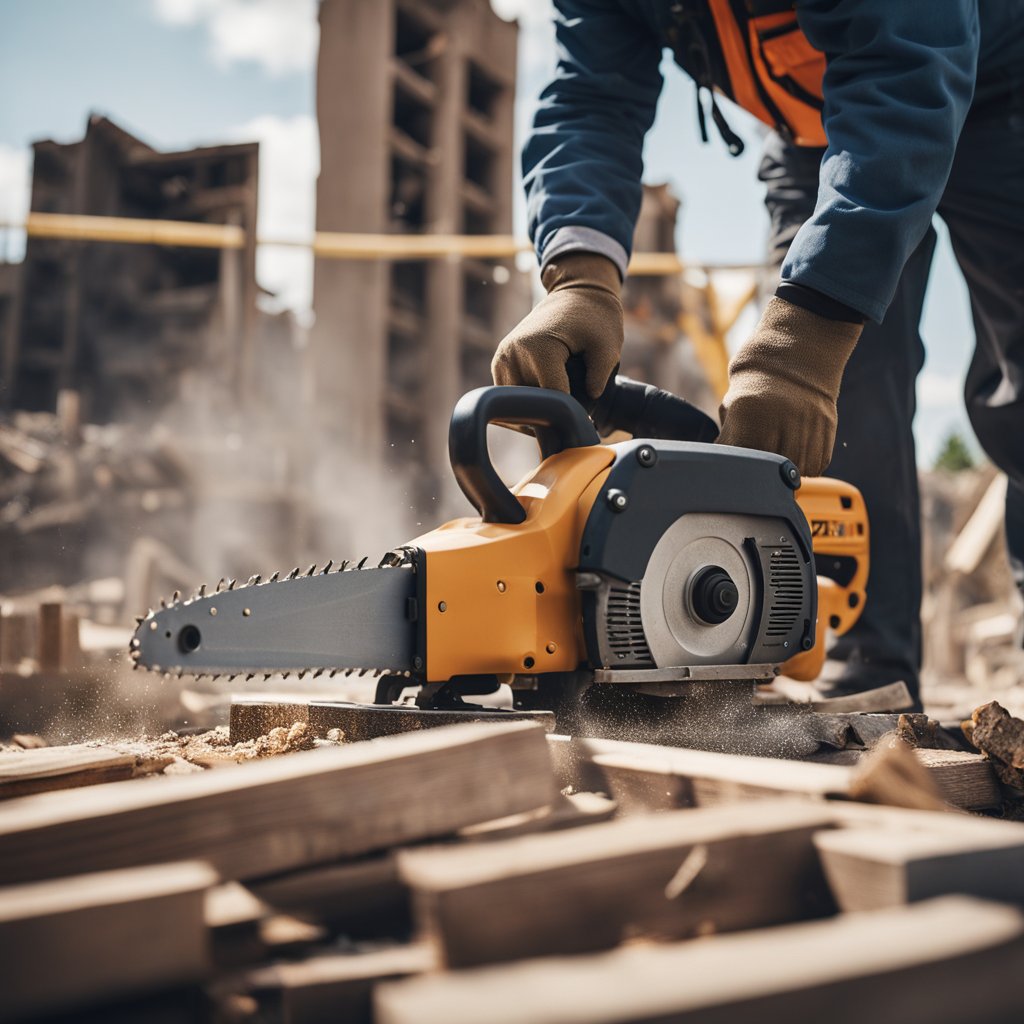Reciprocating saws are essential tools for demolition projects. They make cutting through various materials quick and efficient, necessary for renovations or tear-downs. The right blade can significantly enhance the performance of a reciprocating saw, allowing it to cut through wood, metal, and even concrete easily.
When looking for the best reciprocating saw blades for demolition, it’s essential to consider several factors. Its material dramatically affects how well and long a blade lasts. For example, high-carbon steel blades work well for wood, while bi-metal blades are better for cutting through more rigid materials like metal. The length of the blade is also significant, as longer blades can reach deeper cuts but may be harder to control. Blade tooth count impacts how aggressive the cut will be; fewer teeth mean faster cuts but rougher edges, while more teeth provide smoother cuts at a slower pace. Always use the appropriate safety gear for these blades and protective gear, including goggles and gloves, to forestall harm.
A good grasp of these criteria will assist you in selecting the most appropriate blades for your requirements. We researched and tested multiple options to find the best reciprocating saw blades for demolition tasks. Additionally, we’ve included some tips on maintaining these blades to ensure their longevity and performance. Click here for further information on our site, Ice Age Tools.
Best Reciprocating Saw Blades For Demolition
We have gathered the best reciprocating saw blades for demolition tasks. Their capacity to handle rigid materials makes them indispensable for blade demolition jobs. To help you make an informed decision, we’ve compared these blades based on their material, length, tooth count, and other features. Explore our list to find the blades suitable for your needs.
Diablo Demo Demon 9-Inch Blades
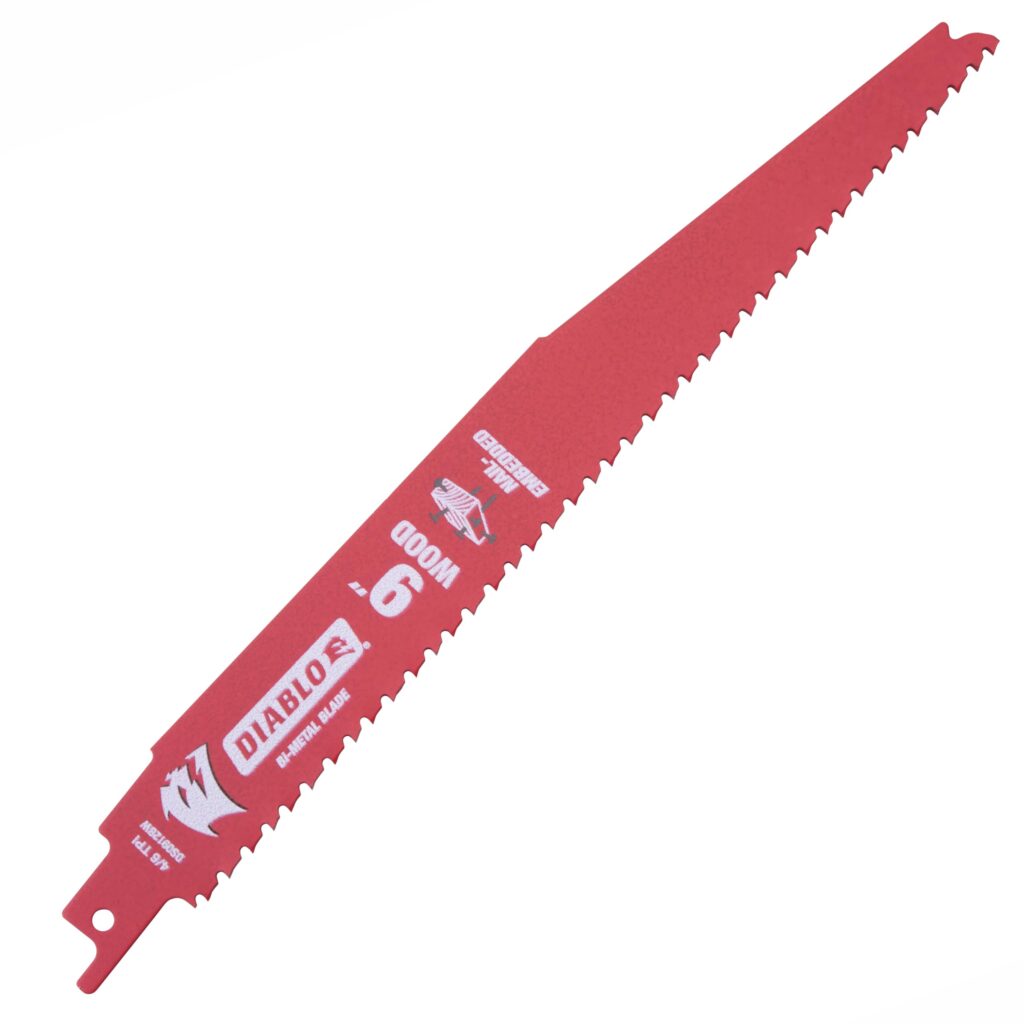
These Diablo blades are great for anyone tackling serious demolition work.
Pros
- Cuts through rigid materials with ease.
- Durable design provides long-lasting use.
- This 25-package is of great value.
Cons
- There may be better choices for finer cuts.
- It can struggle with certain metal types.
- Some users reported receiving older model blades.
Our recent use of the Diablo DS0912BW25 blades for a significant demolition project impressed us. Their 9-inch length and rigid design allowed us to work on various surfaces, including wood with nails and even PVC pipes. The blades tore through everything, significantly reducing our project time. Their versatility in handling different materials was a standout feature, giving us the confidence to tackle any demolition task.
The Perma-shield coating on these blades helps keep them cool and prevent corrosion. We noticed that it helped maintain the blade’s sharpness longer than cheaper options. Even after several cuts, the blades still felt sturdy, and we only used a few from the pack for our enormous demo task.
While these blades excelled in most aspects, we did encounter some challenges. For instance, they may not be the best for precision cutting, and some users noted difficulty with more rigid metals. We found the Diablo demo blades reliable for heavy-duty work without breaking the bank.
Milwaukee 12 Piece Blade Set
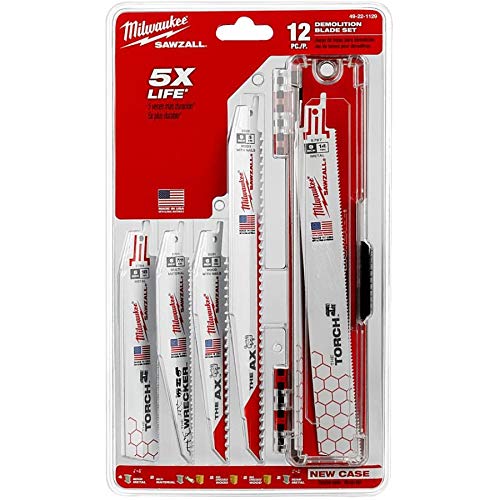
We recommend the Milwaukee 12-piece Blade Set for anyone needing reliable and durable blades for demolition work.
Pros
- Offers a large selection of blades for cutting a wide range of materials.
- Blades are thick and durable, ensuring they last longer.
- A convenient storage case keeps everything organized.
Cons
- Some may find it more expensive than generic options.
- Some users only require a few blades.
- Delivery times can vary, which might be frustrating.
We can attest to their toughness after using the Milwaukee 12-Piece Blade Set. These blades can handle various cutting tasks, and their thicker design ensures they can withstand heavy use, especially in demolition work. The assortment provides versatility, including the AX for wood, the Wrecker for general cutting, and the metal torch. Their durability gives us the confidence that they will last through numerous projects.
The quality shows when cutting through demanding materials like nails embedded in wood or thick metal. Each blade cuts cleanly, making our jobs smoother. The included storage case is a nice touch, too; it makes transporting and organizing the blades easy on the job site.
This Milwaukee pack is impressive for a multi-material blade set. While it may cost a bit more, the durability and performance justify the price. These blades will serve you well in various tasks, from home projects to professional jobs.
Bosch 7-Piece Reciprocating Saw Blade Set
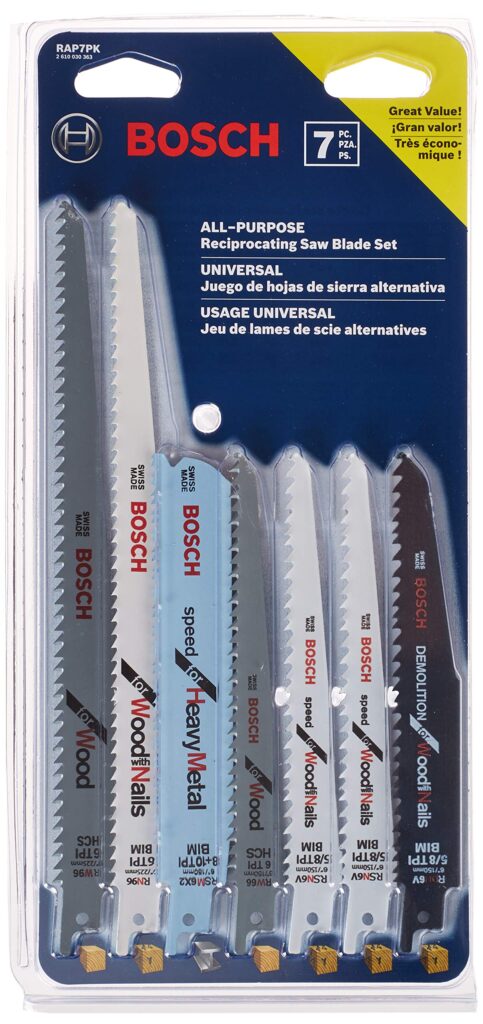
We think the Bosch 7-Piece Reciprocating Saw Blade Set is a reliable choice for demolition tasks thanks to its sharp blades and durable construction.
Pros
- It provides a range of options for cutting metal and wood simultaneously.
- Blades remain sharp even after heavy use.
- High-quality materials enhance durability.
Cons
- It does not come with a suitable blade choice for cutting metal.
- Best suited for light to medium-duty tasks.
- Some users might find them less robust than other high-end blades.
Using the Bosch reciprocating saw blades, we found them to be effective in various demolition jobs. The blend of bi-metal and high-carbon steel makes a real difference, allowing us to smoothly cut through wood, metal, and even wood with nails. The optimized tooth design means faster and cleaner cuts, which we appreciate during tight tasks.
These blades held up well when tackling more challenging materials like metal. The reinforced teeth provide reasonable support and resistance against wear. We noticed they stayed sharper longer than many generic blades we’ve used, leading to less time spent changing blades during projects.
On the downside, we needed a fine metal blade for detailed work. While this set is versatile, it might only satisfy some specific needs if you’re looking for specialty blades. But for general use on residential projects, this set serves us well. This kit is a solid foundation for anyone starting with a reciprocating saw.
TOLESA Reciprocating Saw Blades
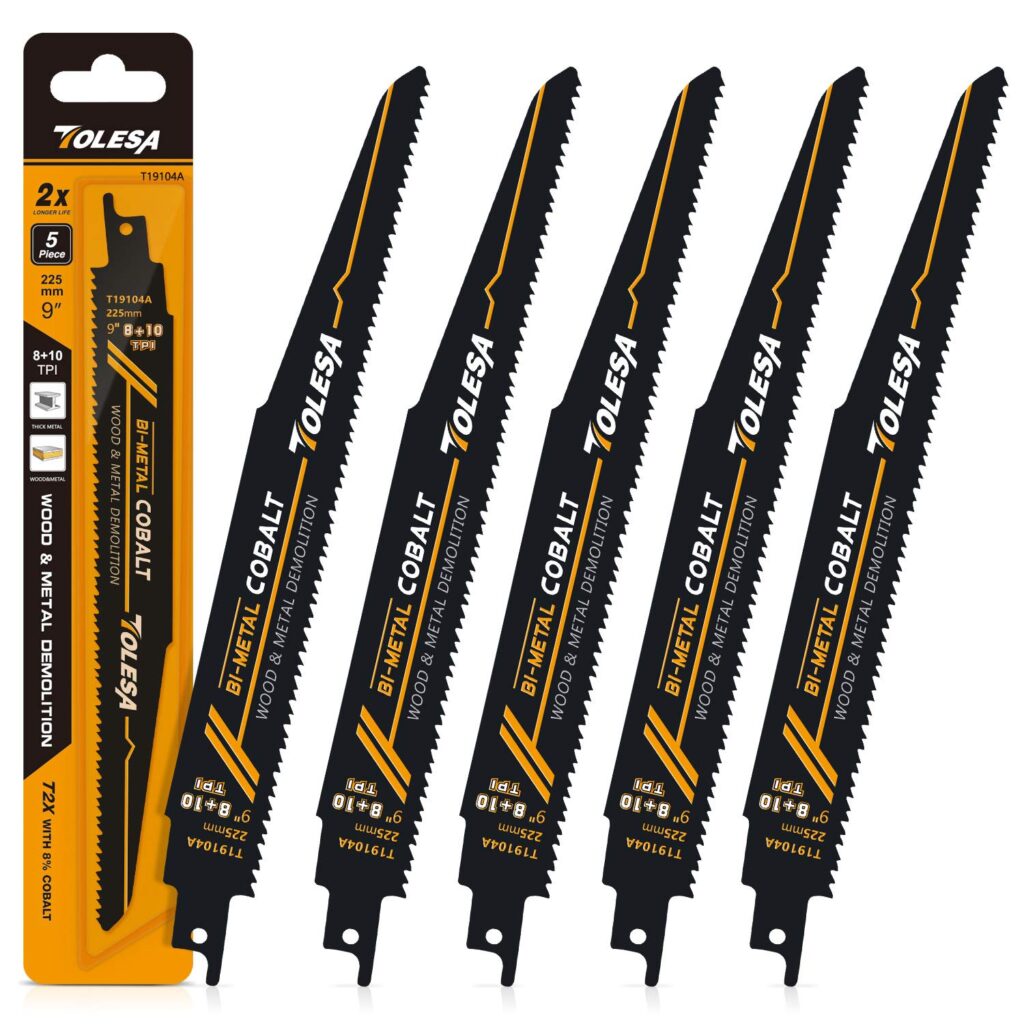
We recommend these blades for challenging demolition tasks due to their durability and practical cutting ability.
Pros
- Durable bi-metal construction with cobalt for tough cuts
- Versatile for various materials, including metal and wood
- The universal shank fits many popular saw brands
Cons
- It can dull more quickly than expected with heavy use
- Some users experienced blade breakage during tough cuts
- Limited longevity compared to more expensive brands
The TOLESA Metal Wood Demolition Reciprocating Saw Blades have been a solid choice for many projects. They cut through thick materials effectively, making them ideal for demolition work. The blades handle wood, metal, and even composites with ease.
Due to the universal shank design, the setup was straightforward. We had no trouble fitting blades from several different brands on our saw. This practicality makes it easier to switch out blades as needed, allowing us to get right back to work. The efficiency of these blades helps us stay productive on the job site.
While these blades perform well, we noticed they can dull sooner than anticipated, especially during heavy-duty tasks. Some of us experienced occasional breakage under harsh cutting conditions. However, considering their performance and the price, these blades offer excellent value for money and are a reliable option for demolition needs.
EZARC Reciprocating Saw Blades
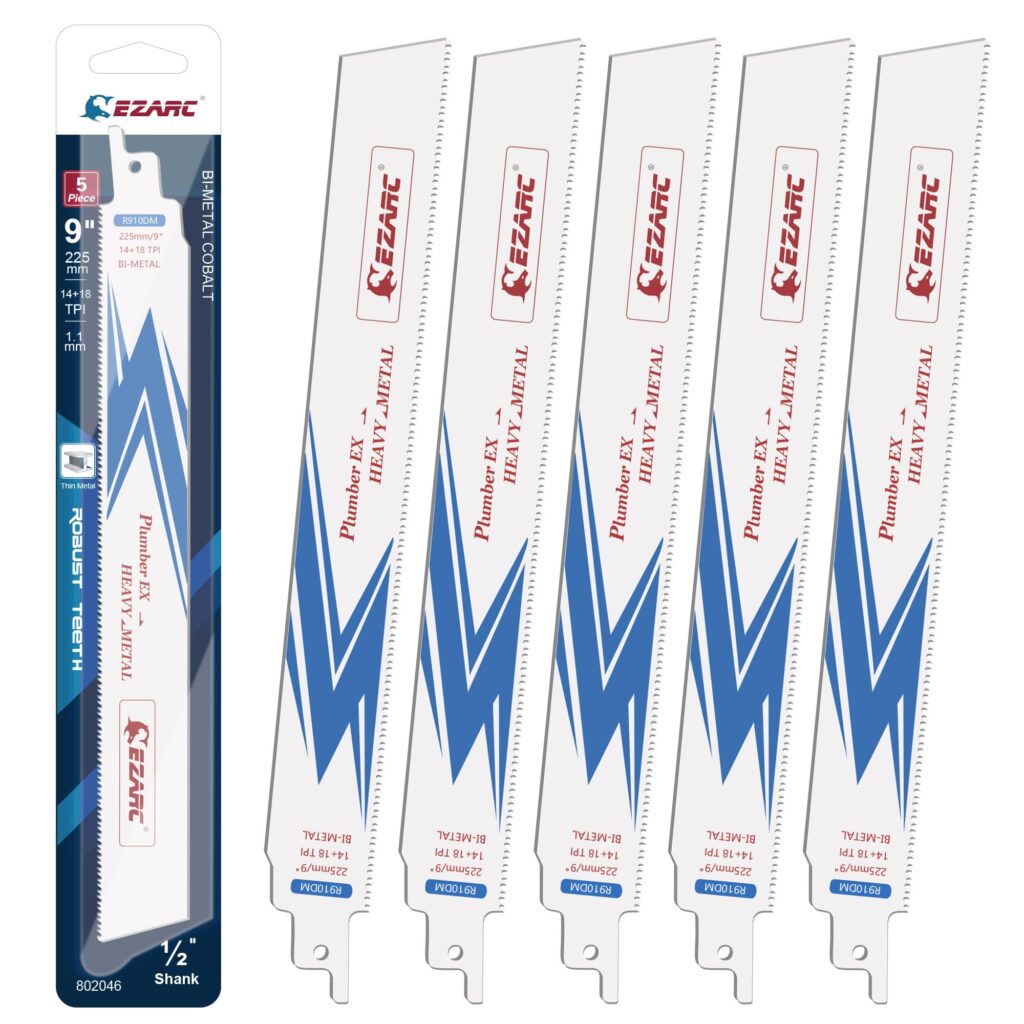
These blades are a solid choice for anyone tackling metal demolition projects.
Pros
- It cuts through metal quickly and efficiently.
- Build quality that outlasts that of regular blades.
- You may enhance adaptability by fitting a range of saw models.
Cons
- It may not hold up well against heavy impacts.
- Slightly less efficient with very thick materials.
- It could require lubricant for better performance.
When we first tested the EZARC blades, we were impressed by their cutting speed. Whether slicing through old metal pipes or dismantling a swing set, these blades cut smoothly and effortlessly. The bi-metal construction feels robust, and the 14+18 TPI tooth design makes a difference in handling tougher cuts.
We’ve noticed some durability advantages with these blades. While we usually go through several blades in a single project, the EZARC saw blades lasted longer than many others we’ve used. They seemed to hold their sharpness even after quickly cutting through materials that typically had dull, less durable blades.
That said, there were a few challenges. They could have been more effective, especially with thicker steel. We recommend using a bit of lubricant when tackling more rigid materials for a smoother cutting experience. Overall, these blades are excellent for anyone needing reliable performance in metal demolition.
Buying Guide
Choosing the right reciprocating saw blades for demolition can make a big difference. Before making our purchase, we need to consider several vital features.
Blade Material
We often find blades made from different materials. Here are some common types:
| Material | Description |
| High Carbon Steel | Good for light-duty tasks. |
| Bi-metal | Combines strength and flexibility. |
| Carbide Tipped | Great for rigid materials like metal. |
Teeth Per Inch (TPI)
The TPI affects how the blade cuts. Here’s what we should consider:
- Lower TPI (3-6): Best for fast cuts in wood and similar materials.
- Higher TPI (10-14): Good for cleaner cuts in metal or plastic.
Blade Length
Longer blades can reach deeper into materials. Common lengths include:
- Six inches: Good for small tasks.
- Twelve inches: Ideal for more demanding jobs.
Cutting Style
Some blades are specifically for use with certain kinds of cuts. We ought to verify the following:
- Demolition: Sturdy blades for breaking through drywall and wood.
- Metal Cutting: Blades designed to handle more rigid materials.
Flexibility
Depending on our needs, we may want a blade with some flexibility. Flexible blades can bend without breaking, which can be crucial in tricky cuts.
Price And Value
We should compare prices but also consider quality. Spending more can lead to better performance and durability in the long run.
Because of this, we can choose the best reciprocating cutting edges for the demolition projects we have coming up.
Choosing the right reciprocating saw blades for demolition work is essential for efficiency and safety. We have looked at several blades that excel in heavy-duty tasks.
We recommend matching the blade type with the materials you plan to cut. For example, use coarse blades for wood demolition and specialized blades for metal or other rigid materials.
Investing in quality reciprocating saw blades can make demolition tasks smoother and more effective. We can optimize our work and achieve better results by considering the correct specifications.
Frequently Asked Questions
We often encounter questions about reciprocating saw blades for demolition. Here, we address critical details around blade characteristics, performance, durability, and suitability for various materials.
What Characteristics Define The Most Effective Reciprocating Saw Blades For Demolition Tasks?
The best reciprocating saw blades for demolition are generally thicker and made of high-quality materials. They often have sturdy bodies to resist bending and breaking during heavy use. Additionally, sharp teeth designed for aggressive cutting improve efficiency and speed in demolition projects.
How Does Tooth-Per-Inch (TPI) Affect The Performance Of Reciprocating Saw Blades In Demolition?
Tooth per inch (TPI) matters a lot in demolition work. A lower TPI, usually around 3 to 10, helps with quick cuts through thick materials. Higher TPI blades, with 10 to 14 teeth, are better for fine cuts but may struggle with larger debris.
What Are The Most Durable Reciprocating Saw Blades For Cutting Through Metal During Demolition?
Bi-metal or carbide-tipped blades are the most durable for cutting metal. They resist wear and heat better than standard steel blades, which is essential when working with tough metals like rebar or iron.
Which Reciprocating Saw Blades Are Best For Demolition Projects Involving Wood With Embedded Nails?
We recommend using high-carbon steel blades or bi-metal options when cutting through wood with nails. These blades can withstand the impact of nails without dulling quickly. A blade designed specifically for demolition often has reinforced teeth for added strength.
What Are The Preferred Reciprocating Saw Blades For Cutting Through Cast Iron In Demolition Contexts?
We find that carbide-tipped blades perform best when cutting cast iron. They cut cleanly and hold up well against rigid materials. Blades labeled for heavy-duty applications typically indicate suitability for cutting cast iron.
What Attributes Are Essential When Selecting Reciprocating Saws For Root And Arboreal Demolition?
Blades with aggressive tooth designs work best in arboreal environments, cutting through thick branches and roots. We should also consider blades made from durable materials that resist moisture and other elements. Length is significant, too, as longer blades can reach deeper into thick vegetation.

